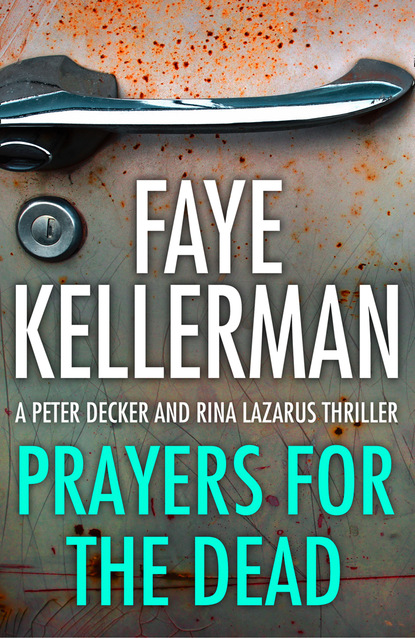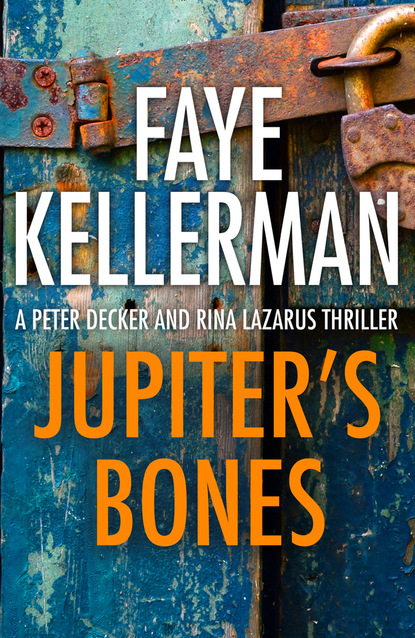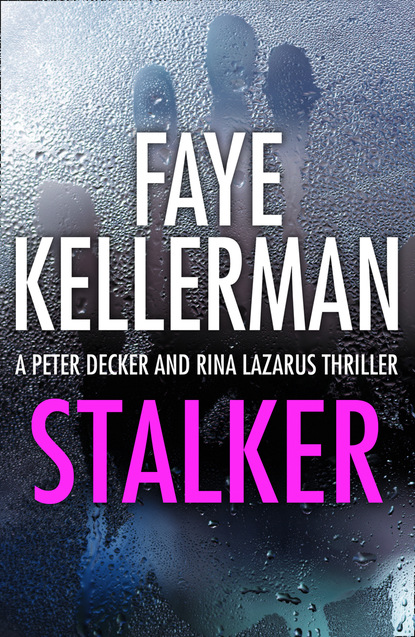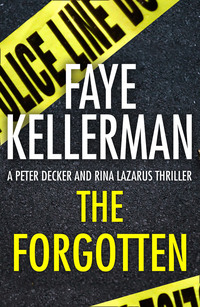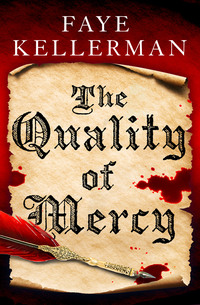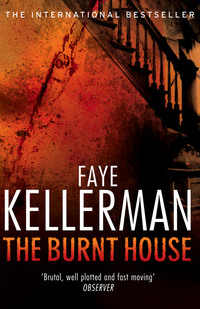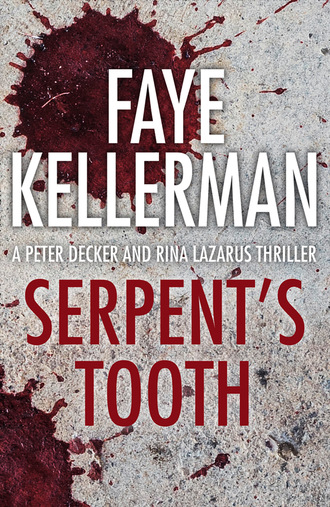
Полная версия
Serpent’s Tooth
“This is horrible.” She touched her mouth with trembling fingers, then pushed thin blond hair off her face. “What happened? Someone just started shooting?”
Oliver shrugged ignorance. “We’re doing a pocket and purse search for ID of the dead. Loo, what about interviewing the survivors?”
Decker said, “Scott, you do the search. Marge, you start interviewing on Scott’s side—Bert, over here!”
Martinez pivoted, jogged over to his team. “Mary Mother of God, I think I’m gonna be sick.”
“Take a deep breath,” Decker said. “Bathrooms are in the back.”
Martinez covered his face with his hands, inhaled, then let it out slowly. “It’s just the putrid smell. Actually, it’s … everything. God, I’m …”
No one spoke.
Then Decker said, “Scott and Marge are working the right side. You work with me on the left.”
“Doing what?” Martinez picked at the hairs of his thick black mustache.
“Interviewing the survivors or IDing the dead. Take your pick.”
“I’ll do the survivors,” Martinez said. “Tom’s on his way. You heard from Farrell?”
“Got hold of his wife. He’s coming down.”
“Think that’s a good idea, Loo? Man’s got a heart condition.”
“Gaynor’s survived close to thirty years on the force, he’ll survive this. Besides, he’s a wonder at detail work … which is what we’re going to need … lots of detail work.”
“And the captain?”
“He was at a meeting in Van Nuys when this went down. Should be here momentarily.”
Decker started in the far left corner of the room, at a large round table for twelve. Two Asian men lay crumpled and unattended on the floor, spangled with bits of china and slivers of crystal. Loose flowers had fallen upon their torsos as if marking the grave site.
Decker did a once-over of the area. About fifty feet away sat a huddle of business-suited Asian males. Nearby were two Caucasians—one female and one male wrapped in blankets and bandages. He nodded to the woman, she nodded back. Her hands and face appeared cat-scratched, probably scored by flying glass. Decker shook off anxiety, gloved, and carefully kneeled down. He checked the bodies’ pulses.
Nothing.
He went through one of the men’s pants pockets. A portly man shot several times in the face and chest. He pulled out a wallet. Carefully, he wrote down the deceased’s vitals from his driver’s license.
Hidai Takamine from Encino. Black hair, brown eyes, married, and forty-six years old.
Decker winced. His own age.
He glanced up. Martinez hadn’t moved, was looking down, staring at the bodies with vacant eyes.
Gently, Decker prodded him. “Get to work, Bert.”
Martinez blinked rapidly. He said, “You in Nam, Loo?”
“Yep.”
“So was I. Sixty-eight to seventy.”
Decker said, “Sixty-nine to seventy-one.”
Silence.
Martinez took a swipe at his eyes, then got to work.
By the time Strapp showed up, Decker had finished identifying the bodies on his side of the restaurant. The captain had given up the pretense of maintaining a calm demeanor. His thin features were screwed up in anger, his complexion wan. Decker brought him up to date as Strapp tapped his toes, his right hand balled into a fist that continuously pounded his left palm.
“Seven dead on my side.” Decker rolled his massive shoulders, stretched his oversized legs as his kneecaps made popping sounds. The bending was doing wonders for his floating patellas. “I’ve identified the victims from driver’s licenses. I’ll go out and inform the next of kin just as soon as I get a body count and names from the other side.”
He looked around, saw that Tom Webster and Farrell Gaynor had arrived. Tom was interviewing survivors along with Bert. Farrell was going through the pockets of the corpses on the right side as Marge and Scott attempted to calm the distraught.
Strapp shook his head, mumbled something.
“Sir?” Decker asked.
“Nothing,” Strapp said. “Just cursing to myself. At last count, there’s something like twenty-eight over at Valley Memorial’s ER. This is just … I’ve got a slew of shrinks outside for support groups … some ER docs as well … in case someone has a heart attack or faints when the news hits.”
“Shall I do it now, Captain?”
Strapp was still hitting his palm with his fist. “We’ll do the dirty work together.”
“What about the press?”
“Okay, okay.” Strapp started bouncing on his toes. “You handle the press, I stay with the family members. Keep the vultures behind the ropes. No announcements until I’ve finished dealing with the next of kin.”
Decker said, “Here’s a partial list of the dead. I’ll bring you the completed list as soon as I can.”
Both of them stalled for a moment; then they went their separate ways.

Though bandaged tightly, the arm was still leaking blood. But the waitress refused to budge, watching over her brood of eight teenage girls with hawkish eyes. Her face was damp with blood, dirt, sweat, and fury. “I am not leaving them until they’re safe and sound with their parents.”
Marge said, “That may take a while, Ms. Anger. You really need to take care of that arm.”
The man sitting with them was the kitchen’s assistant chef—Olaf Anderson. He was pale, but his eyes were steady and his manner stoic. “You don’t do any good if you make yourself sick, Carol.”
“I am fine, Olaf!”
One of the girls—dressed up in a pink mock-Chanel suit—spoke up. She had long permed hair and red-rimmed blue eyes. Her mascara had streaked down her cheeks. “We’ll be okay, ma’am. You should get fixed up.”
Immediately, the girl collapsed into tears.
The waitress hugged her with her good arm, looked up at Marge. “When can they leave? It’s inhuman to keep them here. Right now, everyone’s too hysterical to help you out.”
“It’s true,” said the Chanel girl. “No one was paying attention, we were just like … ducking, you know. And screaming. Everyone was screaming.”
“And praying,” added another.
“You’re …” Marge looked at the pink-suited girl, then down at the list. “Amy Silver?”
The girl nodded.
“You just ducked under the table when the shooting started.”
Again, she nodded. “And screamed. I must have screamed a lot. My throat hurts.”
“Everything hurts,” added another teen.
This one wore a navy suit. Marge consulted her list. Navy suit was named Courtney. “Do you need medical attention, honey?”
Courtney shook her head, her eyes filling with tears. “We just heard like these pops. Then everybody like started to scream. Then we like ducked under the table and like hugged each other. And cried … but like quietly. We were real scared.”
“Too scared to look at anything,” Amy said. “Except that awful green jacket … moving like a blip on a radar.”
“I didn’t see a thing,” Courtney said. “I had like my eyes squeezed shut and was praying real hard—Please, please, just let this be over.” Her eyes overflowed with water. “I’d like to call my mom if I could.”
“When can we see our parents?” Amy asked.
“Soon—”
“How soon?” Carol demanded. “At least let her call her mother?”
“I’m sure she’s outside.”
“So tell her that her daughter’s okay, for godsakes! And when can I call my mother? She must be worried sick about me. She’s not in the best of health.”
“Please, Carol,” Olaf said. “The woman is just trying to do her job—”
“I know that, Olaf. We are all trying to do our job!”
“You must have patience—”
“I’ve been plenty patient,” Carol shot back. “Now I want some action!”
Marge said, “Let me consult with my boss. You all stay put—”
“Well, we can’t exactly go anywhere with the Nazis blocking the doors.”
Marge kept her expression neutral. “I’m so, so sorry. Believe me, the last thing I want to do is cause anyone additional pain. I’ll be right back.”
Carol’s face was still irate, but she held her tongue.
Marge tried out a smile, but Carol responded by rolling her eyes. Before Marge made it to the door, Oliver flagged her down. “You’re going to see Decker?”
“Yeah, we’ve got to start letting some of the people out of here. It’s not fair—”
“I’ll go with you,” Oliver said.
They both stepped into the cool night air, shielding their eyes from the blinding glare of the headlights. Marge quickly counted fifteen vehicles—police cars, press vans, ambulances, and several meat wagons. Her eyes adjusted to the shadows as she made out a group of people inside the tape barrier, off to the left. They’d been sidelined. She could hear their anger stabbing through the mist.
The family members.
The gawkers, along with the press, had been penned outside the yellow tape perimeter, at least fifty yards away.
Marge spotted Decker. His complexion had turned pasty, his big hands had been tightened into white-knuckled fists. She shouted his name. He stopped walking, turned, and came toward them.
Decker said, “You have the finalized list of the dead?”
Oliver showed him the ominous white sheet. “Give it to the captain?”
“Please. I’ve already delivered my allotment of bad news.”
Marge said, “I’ve got a group of teenage girls—”
Decker said, “Go tell their parents. See some tears of joy instead of tears of agony.”
Marge felt her throat tighten. “You all right? What a stupid question.”
“I’m lousy,” Decker said. “Not a fraction as shitty as the group I just left.”
He took a deep breath, let it out slowly, and looked upward. A starless foggy night, a crescent of moon floating in an endless gray sea. “I’ve got to deal with the press.” He turned to his detectives. “Anyone tell you anything useful?”
Oliver said. “Everyone ducked as soon as the shooting and screaming started.”
Marge added, “Lots of screaming, lots of praying.”
“Bullets flying around the room from all directions.”
“From all directions?” Decker asked.
“I think they were using hyperbole,” Marge said.
“Most of them were too busy ducking,” Oliver said.
“Shooter say anything?”
Marge shook her head. “People I spoke to said someone just opened fire. No warning, no nothing.”
“Ditto.”
“So that seems to eliminate robbery as a motive.” Decker rubbed his eyes, told them to go and bring some good cheer.
As he watched them approach the anxious relatives, he tried to collect his thoughts … rid himself of the shrieking and sobbing he had just heard from the unlucky family members. Slowly, he let his fingers uncurl, realized his hands were shaking. He wiped wet palms on his pants, tucked them into his pockets.
He needed something.
He needed a smoke.
As he neared the press corps, he bummed a pack of cigarettes and some matches off one of the uniformed cops. He tried to steady his hands as he lit up, sucking hot, dry smog into his lungs.
It felt acrid, but it did the trick. As nicotine coursed through his body, Decker felt his hands settle down, his brain beginning to clear.
He polished off the cigarette in four inhalations, immediately went for number two. Only after he had smoked it down to the butt was he ready to face the cameras. He ducked under the crime tape ribbon, was charged upon by a cavalry of multimedia representatives. He held up his palms, keeping them at arm’s length, then shouted as best he could. His voice traveled well in the night air. “I’m only going to do this once, so let’s give everyone a fair shot. Anyone out there need a little extra time to set up?”
“Five minutes to set up my camera?” a male voice yelled out.
“Make it ten,” replied a female.
Decker said, “Ten minutes. I’ll read from a prepared statement. Please, please, be respectful, ladies and gentlemen. I will take questions afterward for about fifteen, twenty minutes. Then I’m going to have to get back to work.”
With his announcement, Decker turned inward, lit up a third cigarette, and spoke to no one, ignoring the questions that were thrown at him. He smoked two more cigarettes until the requisite time had passed. After checking his watch, he threw down his fifth butt of the evening, crushed it harder than necessary with his heel. He smoothed his hair and spoke to a wire wheel of microphones. Flashbulbs and video lights attacked his eyes.
“Our first concerns are with the people who need immediate medical attention. All the hospitals and medical institutions in the area have been notified and are giving those inside the benefit of their expertise as well as their staff, facilities, and supplies. We’ve received an abundance of community help from local physicians. The help is needed and appreciated. To everyone out there viewing this broadcast, please, please: If you are not involved in the primary medical care of those injured, stay away from the area so that doctors, nurses, medics, ambulances, and police personnel can move in and out of the area freely.”
The questions started.
What happened?
How many killed?
How many wounded?
Do they have a suspect?
Do they have a reason for the shooting?
What’s it like in there?
Decker turned to the last questioner. A Latina. Sylvia Lopez from the local news station. One of the few broadcasters who gave LAPD a fair shake during its bad times. He took her question.
“What’s it like in there?” Abruptly, he broke into a cold sweat, shuddered involuntarily. “It’s your worst nightmare.”
He wiped his face, was about to field another series of questions, but over an ocean of scalps, he saw Martinez waving at him. One of the many benefits of being six four.
“I’ve got to go,” Decker said. “Excuse me.”
He extricated himself from the lights, cameras, and actions, ducking under the yellow tape and meeting Martinez halfway across the parking lot. Decker threw his arm around Bert’s wide shoulders. “What?”
“There are a lot of people unaccounted for, Loo.” Martinez pushed strands of black, wet hair from his forehead. His face had been bathed in sticky sweat. “We’re directing the families to Valley Memorial, but some of the wounded may have gone to Northridge Pres. We’re trying to get names, but everything’s such a mess—”
“One step at a time.”
“Speaking of which, we may have found the perp. He could have been one of the victims, but it looks like a suicide. Close-range single shot to the head around the temple region. You can see the powder burns—”
“Got a weapon?”
“Smith and Wesson double-action, nine-millimeter automatic—”
“Jesus!”
“Yeah, lots of spraying ability. Pistol’s about five feet away from the body. Forensics is waiting for you or Captain Strapp before they move in. Farrell’s guarding the corpse. No ID on the body, but we got a name from a couple of Estelle’s employees: Harlan Manz.”
“Disgruntled postal worker?”
“Disgruntled bartender.”

“Harlan worked here for around three, four months—”
“Closer to six months—”
“Yeah, well, maybe it was closer to six months.” Marissa, the waitress, sneaked a sideways glance at Benedict, the waiter. “God, I can’t believe it.” Sitting on a barstool, she shivered under her blanket, blond hair falling over her shoulders. “I knew he was angry when he left, but who would have expected …”
Decker stood between the two food servers, his back against the smooth oak bar top. Ten minutes earlier, he had gone through Harlan’s empty pockets, observed the man’s twisted body and blood-soaked head. A close-range shot and a clean one. A 9mm automatic lay a few feet away.
As a corpse, Harlan evoked pity rather than fury. Once he had been a good-looking man. Dark, brooding features now covered with sticky serum. He had died wearing dark slacks, a white shirt, and a green jacket that was splattered with blood, turning him Christmas-colored. The whole evening defied logic.
He returned his attention to the witnesses. “Was Harlan fired from his job?”
“Rather unceremoniously.” Benedict shifted his weight on the stool, scratched a nest of black curls. He was sipping hot water, shaking as he talked.
“What happened?”
“Some asshole at the bar got plastered, started giving Harlan a real hard time. He just blew it, told the guy to get the hell out.”
“A big no-no,” Marissa interjected. “You have trouble with a patron, you’re supposed to report it to the manager and let her deal with it.”
“Any idea why Harlan decided to handle the matter?”
“He probably just had it up to here with rich dicks.” Benedict looked upward. “You get tired of being pushed around.”
Marissa said, “Robin must have heard all the commotion. She came charging in … it was real intense.”
“Is Robin the restaurant’s manager?”
“Yeah,” Benedict said. “She just … started in on Harlan, told him to pack his bags and leave. That was that.”
Decker was skeptical. “Harlan left without a fight?”
“Nothing physical,” Marissa said. “But Harlan and Robin exchanged a few choice words. He was really mad. But she didn’t have to call the cops or anything like that.”
“Was this the only time either of you had ever seen Harlan explode?”
“Harlan was impulsive,” Marissa said. “Did what suited him.”
The servers exchanged brief glances. Decker’s eyes darted between Marissa and Benedict. “What’s going on?”
Marissa looked down. “I went out with him a couple of times. Nothing big. Just a drink after work.”
Silence.
Marissa’s eyes watered. “I had no idea he was …”
“Of course not,” Decker soothed. “Tell me about him, Marissa.”
“Nothing to tell. I thought he was kind of cute.”
Decker looked at Harlan’s corpse, now being worked on by Forensics. It lay some ten feet from the entrance to the bar, resting faceup, eyes open, mouth agape, arms splayed outward, legs bent at the knees. The complexion had taken on a grayish hue, but once it had probably been mocha-colored. Skin that showed wear and tear. Not craggy, but wrinkles about the eyes and mouth. Dark eyes, black hair, a broad nose and strong chin. Latino mixed with a hint of Native American. Looked to be around six feet. Well-proportioned.
“He seems like he could have been a very sexy guy.” He homed in on Marissa’s red cheeks. “Maybe we should talk in private?”
Marissa averted her gaze. “It was nothing serious. Does it really matter?”
“I was just wondering if maybe you were the intended target?”
The girl turned pale.
“No way,” Benedict said. “If he was after anyone here, it would have been Robin.” His voice dropped to a shadow. “And she’s dead, isn’t she?”
Decker nodded. The young man just shook his head. Marissa had tears in her eyes.
“We were never serious, Lieutenant. Honest. He was just studdin’ around. Harlan did a lot of that.”
“A lot of what?”
“Messin’ around. I wasn’t even his real girlfriend.”
Decker sat up. “Who was his real girlfriend?”
“Rhonda Klegg,” Benedict said. “Used to come in here sometimes. Harlan would comp her drinks. Tequila. She could down shooters as fast as any guy I know.”
“Was she an alcoholic?”
Again they exchanged glances. Benedict said, “Well, she could get a little intense. But she kept it under control. I never saw them going at it in public.”
“Going at it?” Decker asked.
Marissa said, “Harlan would come in with a black eye every once in a while. I asked him about it, he laughed it off.” She studied her hands. “God only knows what she looked like.”
Decker said, “Did you ever see them fighting?”
“Not personally, no.”
“Is she also a wait … an actress?”
Benedict said, “Artist. She actually makes money in her chosen field. Got a great gig going. Paints pictures on the walls of rich people’s houses.”
“Murals?” Decker asked.
“No,” Marissa said. “She’ll paint a make-believe garden scene on a wall. There’s a word for it.”
“Trompe l’oeil,” Decker said.
“That’s it,” Marissa said. “Her apartment is full of her stuff. It’s real weird. She’s got the statue of David on the wall of her john.”
“You’ve been to her apartment?” Decker said. “With Harlan?”
Marissa turned bright red. “Well … just once.”
“Did she and Harlan live together?”
“No, Harlan has … had his own place. But he liked being bad … God, I feel like an idiot.” Marissa rubbed her face. “It seemed so harmless at the time.”
Rule number one. Fooling around is never harmless. Decker asked, “Did Harlan have a key to her place?”
Marissa nodded.
Decker became aware of his heartbeat. “Where does Rhonda live, Marissa?”
“The apartment was called the Caribbean. Third floor. It’s near Rinaldi. I could get you the address.”
“I’ll get it.” Decker looked at Benedict. “Anything else you want to add … something that might give us a clue to what went on?”
“Sorry, but I didn’t see a thing,” Benedict said. “When the shooting started, I ran for cover.”
“Where?”
“Made a beeline for the coat closet. I hid there the entire time, too scared to even breathe.”
“I couldn’t tell you anything, either,” Marissa added. “Everyone just started screaming. I dropped under a table.”
“Where were you?”
“Carol Anger and I were working the left rear portion of the room. I had the odd tables, she had the even.”
“Do you recall where the shooting originated?”
“God, no. It seemed like bullets were flying from all directions. I was too petrified to look up.”
Decker looked over his notes, showed them a page. “These are your current names, addresses, and phone numbers?”
Both servers nodded.
“Okay, you can leave.” He handed them each a business card. “If you think of something important about what happened here … or anything important about Harlan Manz, give me a call.”
“Why bother with Harlan?” Benedict said. “He’s dead.”
“Yes, he is,” Decker said. “But by studying men like him … just maybe we can avert … another tragedy. Workplace violence is on the upswing. Least we can do is publicize warning signs.”
Marissa said, “So where do you go from here?”
Decker said, “Right now, I’m going to call Rhonda Klegg. If I have any luck at all, she’ll be alive and pick up the phone.”
“Oh my God!” Marissa said. “You think that maybe Harlan … before this …”
No one spoke for a moment.
Marissa said, “If she’s alive … are you going to tell her … you know … about Harlan and I?”
Harlan and me, Decker thought. He regarded the waitress, looked at her straggly hair falling over a war-ravaged face. “I don’t think it will come up.”
Tears streaming down her cheeks, Marissa thanked him profusely. Decker patted her shoulder, then left to search out a private phone.
There were two offices upstairs, each fitted with phones attached to answering machines that winked red in the dark. Decker flipped on the light switch in the larger of the two rooms. This one was Estelle Bernstein’s personal salon, done in wood paneling with plush hunter-green carpets. Expensively furnished—antiques or good replicas. The abstract artwork wasn’t his style, but it didn’t look cheap. Decker closed the office door from the outside, chose to use the phone in manager Robin Patterson’s hole in the wall.
Small. Utilitarian. A metal desk with a secretary’s chair parked inside the kneehole. A scarred leather couch. The back wall was lined with file cabinets. A swinging door was tucked into one of the corners. Decker pushed it open. An old white toilet, a scratched sink, and a fan that made a racket when the light was turned on. Robin had tried to dress it up by adding a mirror to the wall and a crocheted toilet-paper cover. On top of the john’s tank was a bowl of potpourri. Staring at the dried leaves, flowers, and spices, Decker felt a wash of sadness.


